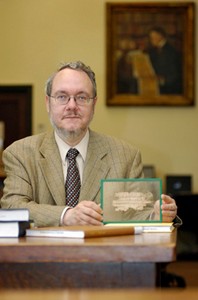
Papyrus Research Provides Insights into the Modern Concerns of the Ancient World
Whats old is new again. Thats the lesson that can be taken from the
University of Cincinnati-based journal
, Bulletin of the American Society of Papyrologists, due out Nov. 1.
The annually produced journal, edited since 2006 by Peter van Minnen, UC associate professor of classics, features the most prestigious global research on papyri, a field of study known as papyrology. (Papyrology is formally known as the study of texts on papyrus and other materials, mainly from ancient Egypt and mainly from the period of Greek and Roman rule.)
Its an area of research that is more difficult than you might think. Thats because it was common among antiquities dealers of the early 20th century to tear papyri pages apart in order to increase the number of pieces they could sell.
Below are five topics treated in the upcoming 2010 volume of the Bulletin of the American Society of Papyrologists. The five issues resonate with our own concerns today.
IOU cabbage
Katherine Blouin from the University of Toronto publishes on a papyrus text regarding a Greek loan of money with interest in kind, the interest being paid in cabbages. Such in-kind interest protected the lender from currency inflation, which was rampant after 275 AD and no doubt also provided a convenient way to get groceries.
Hippo strapped for cash
Cavan Concannon from Harvard University edits a Greek letter in which a priest of the hippopotamus goddess, Thoeris, asks for a money transfer he is waiting for. Such money transfers were for large amounts and required mutual cooperation between two banks in different places that had sufficient trust between them to accept one anothers checks.
American Gladiators ca. 300 AD
Sofie Remijsen of Leuven University in Belgium discusses a Greek letter in which the author details his visit to Alexandria in Egypt, at a time (ca. 300 AD) when the Roman Emperor Diocletian was also visiting the city and demanding entertainment. The letters author, an amateur athlete, was selected to entertain the emperor in pankration (Greco-Roman wrestling with very few rules). He did poorly in this event and so challenged five others to do pammachon, which literally translates to all-out fight, with even fewer rules. The letters author fought five pammachon rounds, and it appears he won first prize.
Alternative medicine: Dont try this at home
Magali de Haro Sanchez from Liège University in Belgium discusses magical texts from Greco-Roman Egypt that use technical terms for fevers (over 20), wounds, including scorpion bites and epilepsy. The prescriptions (magical spells) were as difficult-to-decipher as any written in modern medical scrawl. Here is a translation of an amulet against epilepsy written on gold leaf: God of Abraham, God of Isaac, God of Jacob, our God, deliver Aurelia from every evil spirit and from every attack of epilepsy, I beg you, Lord Iao Sabaoth Eloai, Ouriel, Michael, Raphael, Gabriel, Sarael, Rasochel, Ablanathanalba, Abrasax, xxxxxx nnnnnn oaa iiiiiiiiii x ouuuuuuu aoooooooo ono e (cross) e (cross) Sesengenbarpharanges, protect, Ippho io Erbeth (magical symbols), protect Aurelia from every attack, from every attack, Iao, Ieou, Ieo, Iammo, Iao, charakoopou, Sesengenbarpharanges, Iao aeeuuai, Ieou, Iao, Sabaoth, Adonai, Eleleth, Iako.
Spelling counts: Orthodoxy and orthography in early Christianity
An essay by Walter Shandruk from the University of Chicago examines the ways in which Christ and Christian are spelled in Greek papyri. Chrestos, which was pronounced the same way as Christos, was a common slave name meaning good or useful. Confused by this, representatives of the Roman government often misspelled Christs name Chrestos instead of Christos meaning anointed or messiah. They also called the early followers of Christ Chrestianoi rather than Christianoi. The early Christians themselves went with the Romans here and often spelled their own name Chrestianoi, but they stuck to the correct spelling Christos for Christ's name.
- Apply to UCs undergraduate or graduate classics programs.
- Visit UCs YouTube channel.
Related Stories
Exploring careers in robotics engineering: A path to the future
March 28, 2025
Discover robotics engineering careers: skills, paths, and opportunities in manufacturing, healthcare, and space. Explore salaries and how to start at UC’s CEAS.
President Pinto shares search update for executive vice...
March 25, 2025
President Neville Pinto shares search update for executive vice president for academic affairs and provost
Ohio takes steps to stop spread of invasive pear trees
March 21, 2025
WLWT talks to UC biology Professor Theresa Culley about Ohio's ban on the sale or planting of nonnative and invasive pear trees. The trees are showing up in many parks and wild areas where they are crowding out native species.
